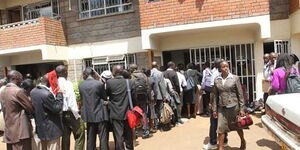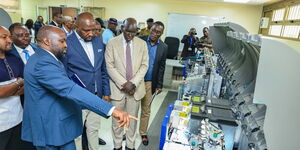There was a time when getting a Kenyan passport meant waiting months and relying on connections or bribes to speed up the process. The Ministry of Interior insists those days are gone.
Today, a passport can be issued in just 7 working days. Simply apply through eCitizen and drop physical copies at the nearest Huduma Centre, avoiding the costly trip to Nairobi.
Immigration, once the face of corruption and inefficiency, has undergone some of the sharpest changes. The government procured new passport printers, easing a backlog that had left thousands stranded. Officials say demand remains high, but delays are no longer the norm.
National identity cards, long a source of public frustration, are now easier to access. Renewals and replacements, though still attracting a fee, take less time thanks to streamlined systems and more registration points across the country.
Behind the quiet transformation is the Ministry of Interior under the stewardship of Cabinet Secretary Kipchumba Murkomen. Since assuming office, he has moved to cut out bureaucracy and widen access to services many Kenyans once considered impossible to obtain without a bribe.
The Ministry, responsible for security, national registration, and immigration, has pushed reforms under mounting pressure. Murkomen’s team has overseen a deep restructuring of administrative units, created a working collaboration with the Ministry of Public Service that runs Huduma Centres, and accelerated immigration processes.
The Huduma model has become the backbone of the reform drive. According to official records, 58 centres are now operational, with a target of 290, one in every constituency. The centres offer services from agencies such as NTSA, KRA, HELB, NSSF, and NHIF, bringing government closer to the people.
The latest opening, the 58th Huduma Centre, was unveiled in February this year. Officials said the goal is not just expansion but efficiency, ensuring Kenyans can apply for birth certificates, student loans, or IDs under one roof. The partnership between the Ministry of Public Service and the Ministry of Interior allows for the crucial services that fall under the latter to be streamlined.
To back the streamlining of services, the Interior Ministry has operationalised 18 new sub-counties and three administrative divisions. In parallel, it has opened 21 Civil Registration Service offices and 25 National Registration Service outlets in the past two years.
The Ministry has also embarked on digital border control, rolling out biometric systems to track entries and exits. The technology, the government argues, not only secures Kenya’s porous borders but also integrates with global security databases, a move critical for counterterrorism.
Observers note that Murkomen has chosen an active role in reforms, touring at least 39 counties through the newly launched Jukwa la Usalama. The platform gives residents of areas like Uasin Gishu an opportunity to speak to the CS directly to cut the red tape. The results, though gradual, have been visible.
Critics argue that challenges remain. Rural areas are still underserved, some Huduma Centres face staff shortages, and corruption has not been fully eliminated. Yet, there is a growing consensus that service delivery is far better today than it was three years ago.












